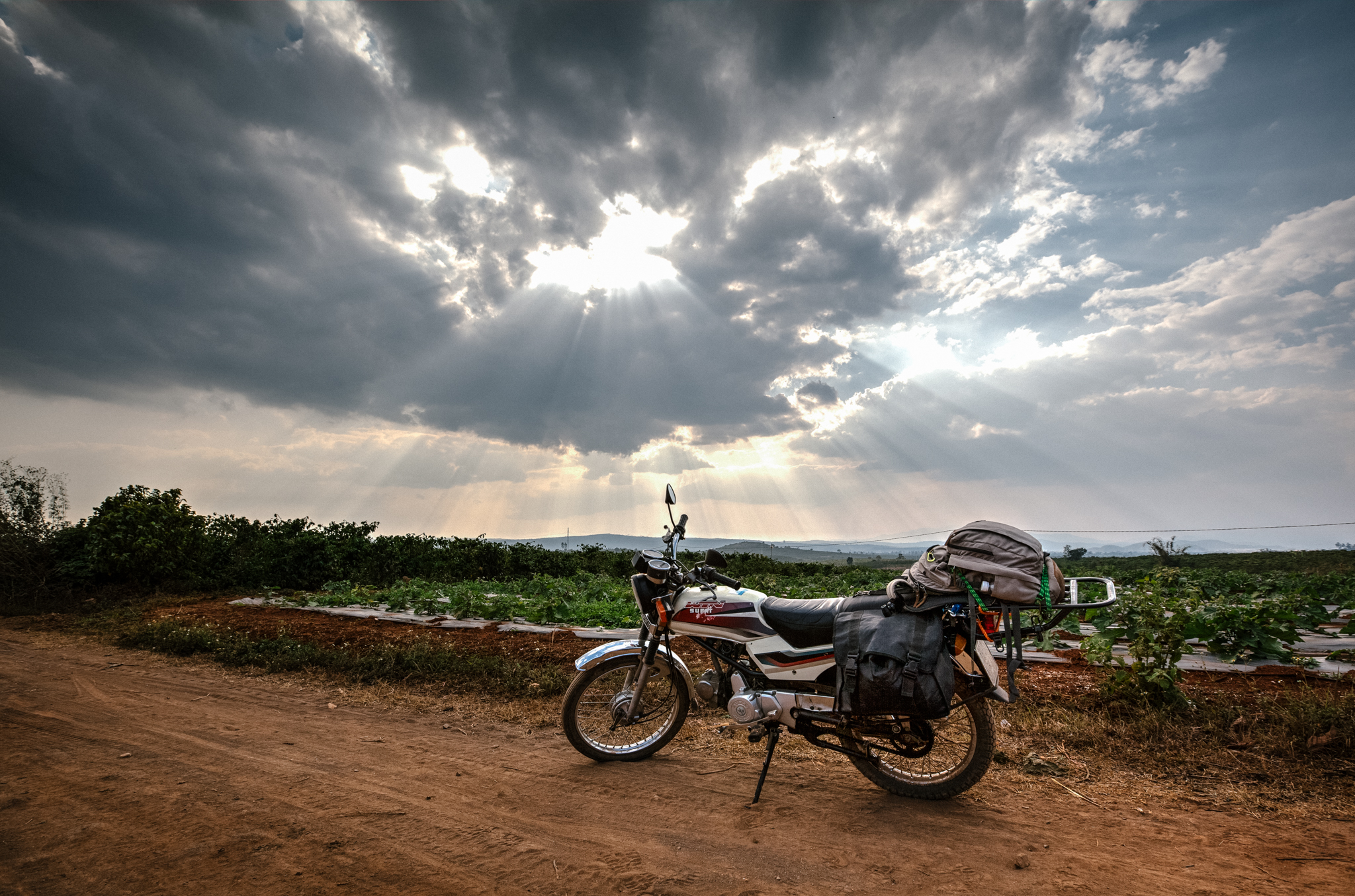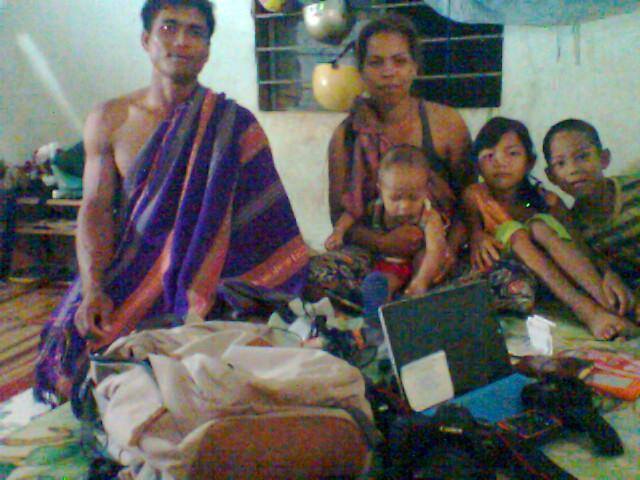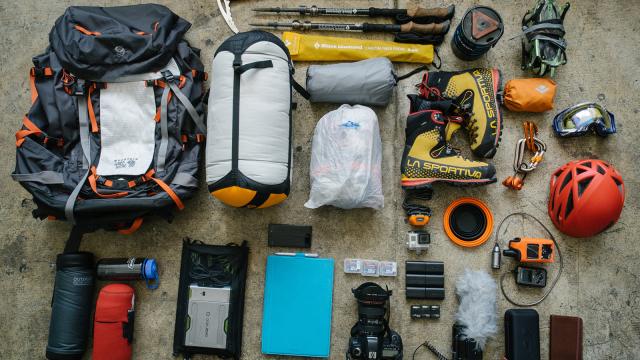Last month while riding a $450 motorcycle through Vietnam, I lost my backpack. It contained my camera, computer, and two hard drives containing seven months of RAW photos and videos. This is what I learned from the ordeal.
First, you’re probably wondering how I managed to lose $8000 worth of equipment that’s essential to my livelihood. It didn’t get lifted. I didn’t entrust some stranger with all of my valuables. It wasn’t stolen from my hostel either.
The morning after concluding a guided tour of the Central Highlands, I headed out on my own. My next destination was three days north at Phong Nha, where I’d explore the third largest cave in the world. The highway I had been following soon turned into an auxiliary road; that turned into a path that was equal parts dirt, gravel, and asphalt — where potholes occupied more area than pavement.
I stopped at an intersection to check the map for directions when a local man rode past me on his scooter. He was pointing frantically behind me. I looked to see what his deal was — then immediately noticed that my pack was gone; the bungee straps were still dangling from my rack.
Today I had the opportunity to drastically change a rural Vietnamese person’s life.
Thanks to some faulty bungee cords, a very bumpy road, and a lack of diligence, a very lucky person has been given either three years income in the form of camera and computer equipment, or even better – the opportunity to jump into a brand new career as a photographer.
I hope that my loss is exponentially someone else’s gain – I only wish that I could have those hard drives back with my last seven months’ of photos and videos.
At least I already booked my ticket home!
This is the last photo I took with my 5D. May it serve it’s next owner well.
I whipped around the 110cc Win and raced; timing was of the essence. Judging from the straps still hanging from my rack, it couldn’t have been gone for long. I remembered navigating a huge bump a couple of kilometres earlier, so I retraced my steps to that point. Nothing. I widened my search radius; scanned the area for hours until I finally gave up and continued on my way, sending out good vibes as I left.
I had been touring around Vietnam for the past two weeks, with the pack more-or-less bungeed on the same way each day. So what gave? Due to the Sufat Win’s small size, most of the cargo weight was distributed over the rear wheel. Before taking off that morning, I broke routine and attempted to distribute the weight better; in an effort to do so, I must have strapped my pack down worse. Shoulda stuck to routine.
A lack of diligence = negligence
There were a dozen things I could’ve done differently that day to prevent my bag from falling off. I could have added a second set of straps. I could’ve worn the pack on my back. I could’ve wrapped my chain and lock around it. But I didn’t. I was lazy and complacent. A lack of diligence equals negligence. I paid dearly for that.
Keep important items close
Passport. Wallet. Phone. Cash. These things should never leave your person. Fortunately, I was very anal about that; as such each of those items were safe despite my loss. And after losing my pack, I didn’t have to scramble to make it home during the final two weeks of my journey. I was still able to travel and I was still able to work. Even if they only thing I had to shoot on was a single GoPro.
Always check twice
You’re sitting in a cab; the driver barely speaks English. You’re using your phone to help navigate to a destination that neither of you have ever been. As the cab approaches the destination, you set your phone between your legs on the seat; begin to scan the surroundings in search of your destination. There it is! The driver pulls up; you hastily pay him and exit the cab. Five minutes later you grab your phone to check in, but wait! It’s not in your pocket. Or your bag. It’s back in the cab. The driver is gone forever; so is your phone.
Scenarios like these are incredibly common when you’re travelling; the most simple way to avoid them is by checking your seat whenever you get up. Whether you’re leaving a taxi, subway, restaurant, or bar — always check twice.

Being more careful than me is the best insurance policy.
Get insured
In the event that you do lose your stuff — whether it’s a camera, phone, or computer — having a travel insurance policy that covers your gear will ensure that you don’t take too much of a loss.
If travelling with high-value items (such as a high-end dSLR and lenses,) increase cover for them as-needed, because oftentimes base policies will not cover the full amount in the event of a high-dollar loss.
I use World Nomads, because in addition to covering all my gear – they also cover adventure activities, from skydiving to mountaineering to bushwhacking and everything in-between.
One backup is not enough
I carried two 2TB LaCie Rugged Mini external hard drives throughout my journey. All of my RAW photos and videos were redundantly backed up to each of those drives each week. I carried one and when I travelled with a buddy, he carried the other, in the event that one of us suffered a loss.
When I started travelling alone I resorted to carrying them both; both in the same bag. My data was protected in the event of a drive failure, but not in the event of a loss or theft. Well, guess what? Both of those drives were in the pack that I lost. I should have continued to carry them separately.
But what about the cloud?
I edited all of my photos along the way; uploaded retina-resolution JPGs to my OneDrive account (where it’s pretty easy to rack up massive amounts of free storage). I also uploaded full-resolution, print-quality JPGs of my favourite shots. However, with more than 1.5 TB of RAW photos and videos and consistently inconsistent wifi connections, there was no way to upload all my files to the cloud.
Typically, about 1 out of 10 photos is a keeper; maybe one-third are worth editing. I use Lightroom to edit; set my export folder destinations to OneDrive, so all of my JPG exports automatically began to upload whenever connected to the internet. I should have used the same process; exported RAW selects to the cloud too. Those RAW selects would have been a much more manageable cloud upload; when I lost my drives, I would have still had my most important original files.
Don’t lose your shit, literally and figuratively
The best way to avoid a heartbreaking scenario like mine is to not lose your shit. But in the inevitable case that it eventually does happen, keep your cool. Only by remaining calm and collected will you have the patience to search for (and hopefully locate) your stuff.
Labels, labels, labels
If you do lose your stuff, there’s a small chance that someone with the best intentions will find it. Make their task of locating you, the owner, as easy as possible by labelling your stuff. If travelling abroad, the name that you use on social media, as well as your email address, are the best pieces of information that you can provide.

This is the Vietnamese family that found my stuff and reached out to me on Facebook to return it.
Don’t give up hope
In the days, weeks, months, or even years after you lose your stuff, don’t give up hope. Someone could be out there, tirelessly trying to reconnect you and your stuff.
Modern junk filters do a pretty good job at fending off unsolicited contact, so keep an eye out on your “other” inbox on Facebook, and your junk folders in email. There could have been a Vietnamese minority ethnic group family trying to reach out to you all along. At least that’s what happened to me. Everything’s on its way back to me right now.
Chris Brinlee Jr. is an adventurer and storyteller who just finished a seven and a half month journey around the world. Follow his adventures on Instagram:@chrisbrinleejr. Check out his travel book on Blurb.
